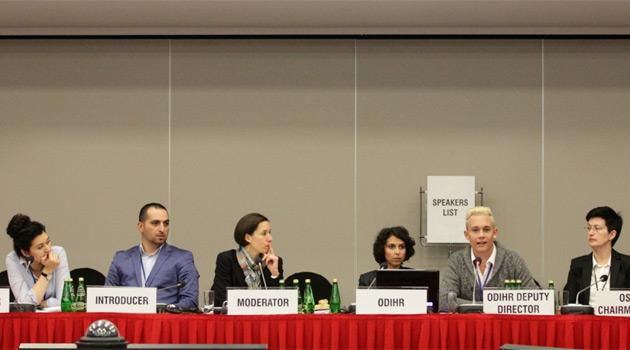Compensation for victims of forced sterilization raised at OSCE event on Roma

Speaking at the Human Dimension Implementation Meeting in Warsaw on 1 October, two Romani civil society members raised the urgent issue of the Czech Government’s decision not to compensate the victims of forced sterilizations, human rights abuses that have taken place over the course of decades in the former Czechoslovakia and its successor states, the Czech Republic and Slovakia, including into the 21st century. Karolina Mirga of the Ternype network raised the issue as well as the continued presence of an industrial pig farm on the site of a former concentration camp for Roma at Lety in the Czech Republic.
Marek Szilvasi of ERRC dedicated his entire remarks to the issue of compensating the victims of forced sterilization, noting that the Czech Government’s rejection of the bill means that "hundreds of Romani women are going to remain without compensation for this human rights violation." Szilvasi urged both the Czech and Slovak Governments to immediately begin developing proper compensation schemes and the Czech Government especially to reconsider its decision.
Archived video of the session on 1 October 2016 is available here (remarks at 2:30). Today’s closing session is being broadcast live here.
On 30 September participants raised the issue of police brutality toward Roma and Sinti communities throughout the 57-state OSCE region. Speakers emphasized that negative stereotypes about Roma are widespread among law enforcement and lead to discrimination in policing.
"The police play an important role in ensuring the protection and promotion of human rights," said Mirjam Karoly, ODIHR Senior Advisor on Roma and Sinti Issues. "Therefore, investment in improving trust and confidence among the police and Roma and Sinti communities is crucial to combating racism and discrimination."
Repressive police practices and a lack of effective investigation and prosecution of crimes against Roma create deep distrust among Roma and Sinti towards the criminal justice system in general. "Criminal cases against police representatives suspected of violence against Roma remain under investigation for very long periods of time, which blatantly violates the standards set by the European Court of Human Rights, related to the duty of the state authorities to conduct thorough and effective investigation within a reasonable time," said Oana Taba of the Romanian NGO Romani Criss.
"Investigations in such cases can be flawed, very often lacking the racial motivation of the perpetrator," Taba noted. Participants also discussed recent police operations targeting Roma and Sinti and their communities.
"The inhabitants of the concerned areas, mostly Roma, were intimidated and harassed by the practice of raid-like joint control activities in segregated Roma settlements by local government authorities in co-ordination with local police," said Szalayné Sándor, Deputy Commissioner for Fundamental Rights of Hungary. "These practices are incompatible with the principle of the rule of law and the requirement of legal certainty."